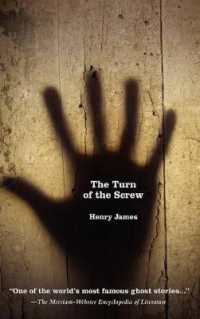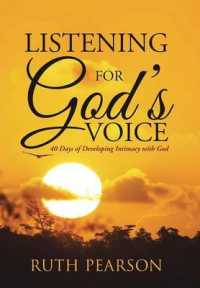Full Description
Neuroliterature 2 Biography, Semiology, Miscellany gathers occasional and more substantive pieces written around the theme of medical history in the 17th 18th and 19th centuries including biographical pieces, considerations of the semiology of terms used in clinical medicine, and a miscellany of pieces on related medical topics. It will be of interest to those who are interested in literary portrayals of neurological disorders and builds upon and supplements Andrew Larner's previous volume (Neuroliterature. Patients, Doctors, Diseases. Literary perspectives on disorders of the nervous system) published in 2019.
Contents
Contents; Foreword; Dr Christopher Gardner-Thorpe; (President, History of Medicine Society, Royal Society of Medicine); Introduction; Biography:; Thoughts on medical biography; Richard Lower (1631-1691); Edward Tyson (1650-1708) and The Anatomy of a Pygmie, 1699; Lord Monboddo (1713-1799) and Charles Dickens; Mrs Elizabeth Inchbald (1753-1821) and Charles Dicknes; Matthew Baillie (1761-1823); Michael Faraday (1791-1867): "loss of memory" revisited; Samuel Gaskell (1807-1886); Dickens (1812-1870) and neurology; William Carpenter (1813-1885): a scientific influence on Elizabeth Gaskell?; William Alexander (1844-1919): epilepsy care in Liverpool in the late 19th century; Sir William Gowers (1845-1915): his comments on cognitive dysfunction; Medical practitioners and practice on Livingstone's Zambesi expedition, 1858-1864; Richard Wolfgang Semon (1859-1918); William Barnett Warrington (1869-1919); Semiology:; Dolichocephaly and brachycephaly; Echo phenomena; Echolalia; with a note on some synaesthestic phenomena; Gambling; Geophagia (geophagy) and pica (pagophagia); Hyperkinetic motor perseverations; Hypermnesia; Lassitude; ivContents; Mirror phenomena: clinical catoptrics; Pseudomelia and pseudopolymelia; Syllogomania; What's in a name? A diagnosis by any other name would be as meet?; Miscellany:; Neurology and literature; The neuropsychology of board games, puzzles and quizzes; Scrabble-ing with dementia; Dysphonia clericorum: Clergyman's sore throat; "Holy dementia": religious contributions to understanding brain disease; Neurological literature: a clinical trial; The demise of botany in the medical curriculum; Medical memorials in the Linnean binomial taxonomy; Osler centenary; Sherlock Holmes as "an exact embodiment of somebody or other"; Anthony Trollope (1815-1882) and headache; Kraepelin's analogy: the brain as a pipe organ; "Neurological literature": Headache 10; A short history of neurology in a short neurological history; "Idiots" and "naturals": contextualising Elizabeth Gaskell's; portrayals of intellectual disability; Book reviews:; Neuroarthistory; Confabulation; History of British Neurology; The neurological patient; Neuroethics of biomarkers; Representing epilepsy; Histories of Scottish medicine; Dickens and the workhouse; Memory: patient HM; American Civil War; Lancaster; Smallpox: Benjamin Jesty; Roald Dahl; Metabiography?; Robert Burton: The Anatomy of Melancholy






